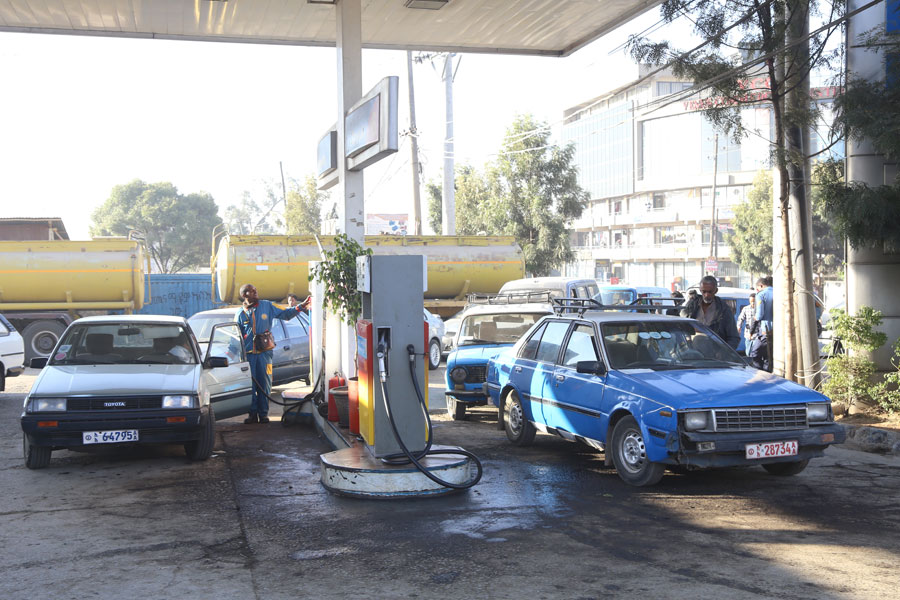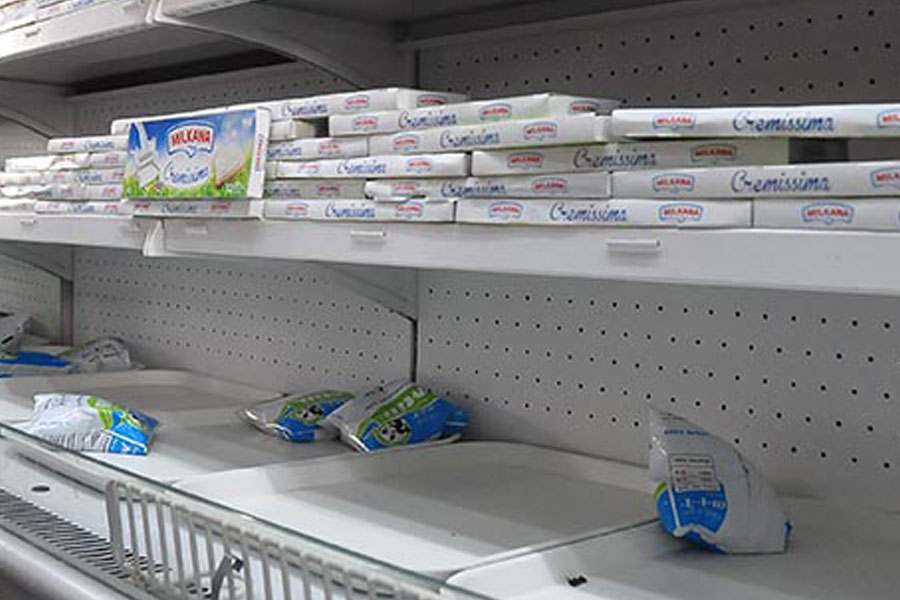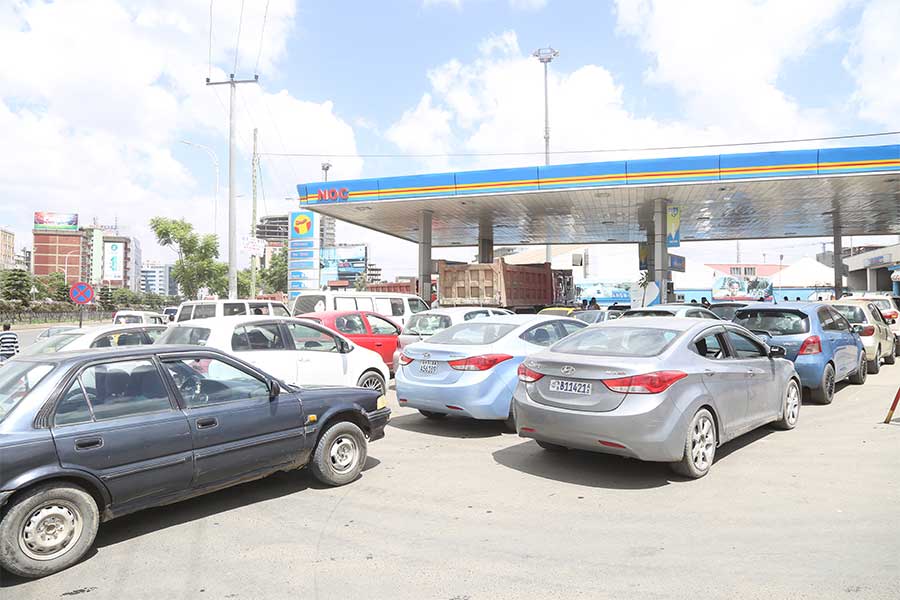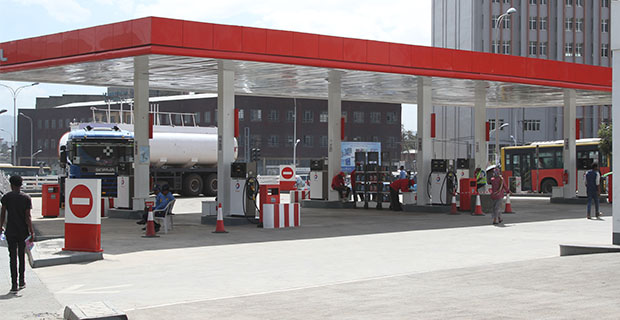
Fortune News | May 18,2024
Over the last week, main roads of the capital were crowded and the traffic was heavy since most of the roads were blocked by long queues of vehicles at gas stations to fill up on gasoil.
On the evening of June 26, 2020, one of Total Ethiopia's gas stations located in Temenja Yaz on Sierra Leone Street was also unusually full, packed with cars waiting their turn.
Most drivers did not know what was really going on with the supply of gasoil, but they have been spending extended hours in long-distance queues. Since early last week, the city has been struck with a gasoil shortage following right on the heels of the recent benzene shortage.
The 24-year-old Birhan G. Kaidan is one of the drivers who queued at Total's station to fill up his tank. He drives a minibus taxi that gives service to the employees of the state giant Ethio telecom.
Since he could not get gasoil, Birhan did not give service to Ethio telecom’s employees for two days in a row. He also had a scheduled field trip outside of the capital but was forced to cancel because he ran out of fuel.
“I still have no idea what happened and what to do,” he said.
Birhan, who has been serving Ethio telecom for the past three years, has never experienced a shortage of gasoil this acute before.
“This is the first time I spent a long time in the oil queue to buy gasoil," he said.
Zewdie Worku, a 42-year-old father of four children, is another citizen of the capital who has fallen victim to the gasoil crisis. Zewdie had been leaving his house in the morning starting from last Tuesday to fill his tank.
The taxi diver, who covers his and his family's costs from his income, is waiting at least five hours a day to fill his fuel tank.
One of Total Ethiopia's gas stations located in Temenja Yaz on Sierra Leone Street ran out of gasoil without the government resupplying it in time.
“It’s been seven months since I started working as a driver," said Zewdie, "and the current situation is making me hate the job.”
Both the users and the oil retailers believe that the latest shortages are exceptional.
Tewodros Yeshiwas, managing director at Gomeju Oil Ethiopia, says that this is the first time his company has experienced such a shortage of gasoil.
His company has operated with 69 stations, 2,000 employees and 219 trucks since 2016.
Even when there is a shortage of any type of fuel products, the problem is temporary, according to Tewodros.
"But I don't understand why the Enterprise did not extract the gasoil from the nearest reserve and distribute it as soon as possible," he said.
The Ethiopian Petroleum Supply Enterprise is the only company authorised to import petroleum. It imports benzene, jet fuel, gasoil, kerosene and light and heavy black diesel and distributes the petroleum to close to 30 oil retail companies across the country. During the first half of this fiscal year, Ethiopia has imported two million tonnes of petroleum products with a value of 35.3 billion Br. This represents a 16.5pc annual expansion in the volume.
"The demand for gasoil is high since many projects, heavy machines and vehicles are in dire need of it," said Tadesse Hailemariam, CEO of the Enterprise.
The Enterprise and the Ministry of Trade & Industry state that the latest shortage has occurred after the government dedicated the Sululta Strategic Reserve Depot to benzene only. The Depot, which has the capacity to hold 60,000 cubic metres of fuel, used to hold all types of fuel.
Filling the Depot began on June 1 and is planned to be finished by July 30, and it is expected to serve as a reserve for three months, according to Tadesse.
On a daily basis, an average of 300 fuel trucks are deployed from Djibouti carrying different types of petroleum. And 15 to 20, which have a carrying capacity of 45,000lt of benzene each, go to the Sululta Depot.
The Enterprise claims that the filling of the Strategic Depot is not the only reason for the shortfall. Officials there say the problem also lies with the backwards logistics system that the country uses.
The two-day road blockage at a border crossing between Ethiopia and Djibouti last week due to a cargo truck accident was another cause of the shortage, according to Tadesse.
By June 24 and 25, the Enterprise had resumed imports and supplied 18.1 million litres of gasoil. Of the total four million tonnes of petroleum the country imports a year, about 65pc is gasoil and 13pc is benzene.
The government is working on increasing the number of depots in the country to boost the reserve, according to Eshete Asfaw, state minister for Trade & Industry.
In addition to the Djibouti and Awash depots, the government opened depots at Kombolcha, Gonder and Bahir Dar on June 27, 2020, as part of an effort to alleviate the problem of the supply shortage, according to Eshete.
There are people who are trying to take advantage of the situation, according to Eshete.
“We found out that there are also people who took advantage of this opportunity by engaging in illegal business,” said Eshete.
Issues related to a logistics system is also another problem that is causing a supply shortage, and it will never be resolved unless a consistent strategic solution is sought, according to Tadesse. Currently, there are 121 fuel stations in the capital.
There are various reasons behind the occasional fuel shortages, according to Tadesse Girma, secretary-general at the Ethiopian Oil Companies Association. The Association, which was established in August 2017, has seven members including NOC, Libya Oil, Total Ethiopia, Yetebaberut Beherawi Petroleum, TAF Oil, Kobil Ethiopia and Gomeju Oil.
Many trucks are stranded at Djibouti waiting for their turn to load; however, beginning Thursday, June 25, the Enterprise authorised oil companies to load gasoil from the Awash fuel depot, according to Tadesse of the Association.
Serkalem GebreKirstos (PhD), an expert in the petroleum industry for more than a decade, argues that both of the reasons mentioned by the authorities are not sufficient causes for the fuel shortage in the capital.
Serkalem explains that the problem is typically the result of supply chain issues.
“How much demand and supply will be met should be thoroughly studied,” said Serkalem.
After Dukem reserve depot, which costs 140 million dollars and has a capacity to hold 300,000 cubic metres, becomes operational, the country's reserve capacity will be boosted to 60 days from the current 36 days, according to Alemayehu Tsegaye, communications director of the Enterprise.
The Enterprise had to plan ahead that a shortage could occur when they were considering filling the Sululta Strategic Reserve Depot, according to Alemayehu Geda (PhD), an economist and university lecturer at Addis Abeba University’s Faculty of Business & Economics.
“The shortage has a major impact on heavy trucks, construction projects, as well as trucks that serve agricultural purposes,” said Alemayehu.
Serkalem also recommended that the Ministry of Trade & Industry, the Ministry of Transport and the Enterprise itself should work together to improve the supply chain and its facilities.
PUBLISHED ON
Jun 27,2020 [ VOL
21 , NO
1052]

Fortune News | May 18,2024

Commentaries | Jan 14,2023

Fortune News | Jan 19,2019

Fortune News | Apr 29,2023

Radar | Sep 23,2023

Radar | Feb 26,2022

Radar | Dec 26,2020

Fortune News | May 08,2022

Fortune News | Sep 28,2019

Fortune News | Aug 17,2019

Dec 22 , 2024 . By TIZITA SHEWAFERAW
Charged with transforming colossal state-owned enterprises into modern and competitiv...

Aug 18 , 2024 . By AKSAH ITALO
Although predictable Yonas Zerihun's job in the ride-hailing service is not immune to...

Jul 28 , 2024 . By TIZITA SHEWAFERAW
Unhabitual, perhaps too many, Samuel Gebreyohannes, 38, used to occasionally enjoy a couple of beers at breakfast. However, he recently swit...

Jul 13 , 2024 . By AKSAH ITALO
Investors who rely on tractors, trucks, and field vehicles for commuting, transporting commodities, and f...

Oct 11 , 2025
Ladislas Farago, a roving Associated Press (AP) correspondent, arrived in Ethiopia in...

Oct 4 , 2025
Eyob Tekalegn (PhD) had been in the Governor's chair for only weeks when, on Septembe...

Sep 27 , 2025
Four years into an experiment with “shock therapy” in education, the national moo...

Sep 20 , 2025
Getachew Reda's return to the national stage was always going to stir attention. Once...